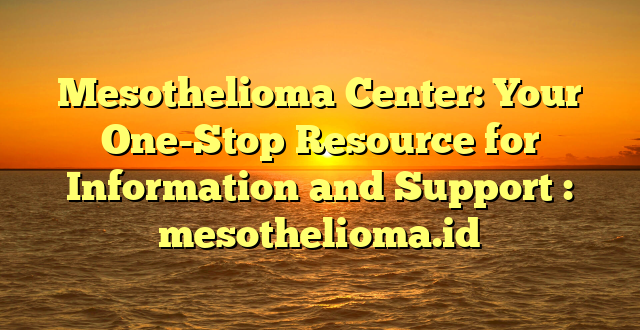Hello and welcome to the Mesothelioma Center, your go-to source for all things related to mesothelioma. Mesothelioma is a rare but deadly form of cancer caused by exposure to asbestos. It can affect the lining of the lungs, chest, abdomen, or heart, and is typically not diagnosed until it has reached an advanced stage. If you or someone you love has been diagnosed with mesothelioma, it can be overwhelming and confusing. That’s where we come in. Our center is dedicated to providing information, resources, and support to those affected by mesothelioma, and we are here to help you navigate this difficult journey.
What is Mesothelioma?
Mesothelioma is a type of cancer that develops in the mesothelium, which is the thin layer of tissue that covers most of the internal organs in the body. The most common type of mesothelioma is pleural mesothelioma, which affects the lining of the lungs. Other types include peritoneal mesothelioma (affecting the lining of the abdomen), pericardial mesothelioma (affecting the lining of the heart), and testicular mesothelioma (affecting the lining of the testicles).
Mesothelioma is caused by exposure to asbestos, a naturally occurring mineral that was commonly used in various industries due to its heat-resistant properties. When asbestos fibers are inhaled or swallowed, they can become lodged in the mesothelium and over time, cause genetic changes that lead to the development of mesothelioma.
The symptoms of mesothelioma can vary depending on the location of the cancer, but may include chest pain, shortness of breath, coughing, fatigue, weight loss, abdominal swelling, and more. Unfortunately, mesothelioma is often not diagnosed until it has reached an advanced stage, which can make treatment more difficult.
If you have been diagnosed with mesothelioma, it’s important to seek medical care as soon as possible. Your doctor may recommend a combination of treatments, such as surgery, chemotherapy, and radiation therapy, to help manage your symptoms and potentially slow the progression of the cancer.
Mesothelioma Center: What We Do
At the Mesothelioma Center, our mission is to provide information, resources, and support to those affected by mesothelioma. Whether you are a patient, caregiver, or loved one, we are here to help you navigate this challenging journey.
Some of the services we offer include:
| Service | Description |
|---|---|
| Informational Resources | We provide in-depth information about mesothelioma, its causes, symptoms, and treatment options. We also offer resources for finding mesothelioma specialists, clinical trials, and more. |
| Support Network | We offer a supportive community for those affected by mesothelioma. Our online forum allows patients, caregivers, and loved ones to connect with others who are going through similar experiences. |
| Legal Help | For those who have been exposed to asbestos in the workplace or elsewhere, we offer resources and guidance for finding legal help. We work with experienced mesothelioma attorneys who can help you navigate the legal process. |
| Advocacy | We advocate for mesothelioma patients and their families by raising awareness about the disease, promoting research, and working to improve access to care. |
Mesothelioma FAQs
What is the prognosis for mesothelioma?
The prognosis for mesothelioma can vary depending on a number of factors, including the stage of the cancer, the location of the tumor, and the overall health of the patient. Unfortunately, mesothelioma is typically not diagnosed until it has reached an advanced stage, which can make prognosis more difficult. However, with early detection and prompt treatment, some patients can experience improved outcomes.
What are some common treatment options for mesothelioma?
Treatment options for mesothelioma may include surgery, chemotherapy, radiation therapy, and immunotherapy. The specific treatment plan will depend on the location and stage of the cancer, as well as the individual patient’s health and preferences.
Is mesothelioma always caused by asbestos exposure?
While asbestos exposure is the primary cause of mesothelioma, there are some cases where the cancer may develop without clear exposure to asbestos. Other potential risk factors include radiation exposure, environmental exposure to certain chemicals, and genetic mutations.
How can I find a mesothelioma specialist?
Finding a mesothelioma specialist can be challenging, but there are resources available to help. The Mesothelioma Center offers a directory of mesothelioma specialists, as well as tips for choosing the right doctor for your needs. Your doctor or cancer center may also be able to provide a referral to a specialist.
What can I do to reduce my risk of mesothelioma?
The most effective way to reduce your risk of mesothelioma is to avoid exposure to asbestos. If you work in an industry where you may be at risk of asbestos exposure, be sure to follow all safety precautions and wear protective gear. If you live in an older home or building, be cautious when doing renovations or repairs and have the area tested for asbestos before beginning work.
Conclusion
The Mesothelioma Center is dedicated to helping those affected by mesothelioma by providing information, resources, and support. Whether you are a patient, caregiver, or loved one, we are here to help you navigate the challenges of mesothelioma and find the care and support you need. Please don’t hesitate to reach out to us if you need assistance or have any questions.
